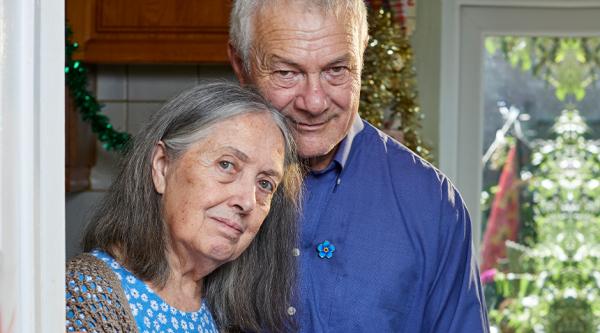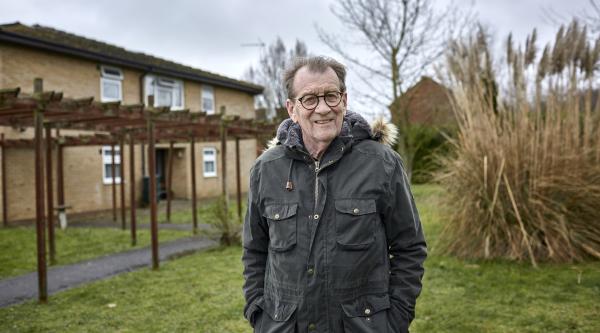How children and young people respond when a person has dementia
Children and young people can respond in a number of different ways when someone close to them has dementia. We look at common reactions and worries of children and young people, as well as signs of distress.
- Explaining dementia to children and young people
- How to involve children and young people
- You are here: How children and young people respond when a person has dementia
- Ways you can support children and young people when a person has dementia
Explaining dementia to children and young people
A child or young person’s ability to understand and cope will be shaped by their lives and their relationship with the person with dementia. Changes at home can make a child or young person feel anxious. It is important to be mindful of and recognise their needs.
Worrying they've done something wrong
Young people can believe that they are responsible for the way that people around them act. This can include the person with dementia and other family members. This is a common reaction of young people to any unhappy or difficult situation, especially if they do not understand it.
They may also feel this way if they are not given a clear explanation of what dementia is and how it can affect people. Or they might forget. For example, the person with dementia may act in a way that is out of character. The child or young person may then think they have done something wrong to cause it.
It is important to remind them that what the person is doing is due to their dementia, and not for any other reason. Providing information about dementia and why the person seems different will help ease their anxieties.
On difficult days, adults caring for someone with dementia may be at home less than before. They may also find it difficult to manage the practicalities of caring. Children and young people might see this as their fault.
It is very important to reassure children and young people that they haven’t done anything wrong. Tell them they’re not responsible for the way that others are feeling or acting.
Talking to young people about their feelings
Children and young people can respond in a number of different ways when they find out that a person has dementia.
Children and young people may be afraid to talk about these feelings and worries. They may see that you and other adults are already under strain and not want to cause any further upset.
Older children and teenagers may feel embarrassed to show their feelings. Or they might distance themselves by becoming uninterested or detached. They may need gentle encouragement to talk about their feelings.
Think about who they would most likely want to speak to. This may be other family members, friends, or professionals such as a therapist or a counsellor.
- Confusion – they may be unsure what dementia is and how to respond to it. If the person with dementia is their parent, they may also feel confused about ‘role reversal’. This means feeling the need to be responsible for their parent who used to be responsible for them.
- Sadness, grief or loss – they may feel sad about what’s happening to the person they love. They may also feel loss or grief if the person doesn’t seem to be the same as before. Or that they can’t interact with each other in the same way anymore. They might also feel ‘anticipatory grief’ once they know that dementia is a terminal condition.
- Anxiety and fear – they may feel nervous about being with the person with dementia. They may be nervous of the person’s changing behaviour and not know how to act around them. Some children or young people may worry about the future. This could include worries about what will happen to the person with dementia and if they will develop dementia themselves. They may also worry if they can go away, for example to university.
- Anger and frustration – they may feel angry about the situation and feel it is unfair. They may also feel bored or frustrated at having to answer the same questions. Or they may be annoyed that they can’t go out with their friends if they have to be with or look after the person. They may also find it difficult to express other emotions, which can come out as anger or aggression.
- Embarrassment – they may feel embarrassed at how the person with dementia behaves. They may also feel they are treated differently at school or amongst friends, as being the relative of a person with dementia.
- Rejection – they may feel rejected if other family members are under pressure and seem to have less time for them than before. This can be difficult if they are going through exams or forming romantic relationships and need family support.
- Responsibility to protect others – they may feel they can’t share worries about feelings or events in their life. This may be to protect family members.
- Guilt – they may feel guilty for feeling any of these emotions or thinking negative thoughts about the person with dementia.
Spotting signs of distress
The needs and signs of distress of children and young people can sometimes go unnoticed. This can happen when families focus on the person with dementia, especially as their needs change.
If you are worried about how a situation is affecting a child or young person, the following signs may be useful to look out for.
- Anxiety-related symptoms. These can include nightmares, difficulty sleeping, or waking through the night. They may be quick to anger or not able to control their emotions.
- They may also be tense, fidgety or clingy. Unexplained aches and pains are also signs of anxiety. Eating more or less than usual, feeling or being sick, or constantly feeling tired can also be signs that they are anxious.
- A deterioration in their schoolwork. Upset children and young people may find it harder to concentrate. They may feel unmotivated to work and their schoolwork or studies may suffer.
- Appearing unaffected. A child or young person may appear uninterested or unusually cheerful. They may be bottling things up or putting on a brave face. You can help by encouraging them to talk about the situation and express their feelings.
- Being sad and weepy. Some children and young people respond by feeling very upset. They may need a great deal of attention over a long period of time. Even if you are feeling under a lot of pressure, try to give them time each day to comfort them and talk things over.
- Retreating from the situation. Older children and teenagers can often seem preoccupied with their own lives. They may retreat to their own rooms or stay out more than usual. They may find the situation hard to handle. This may be because of all the other changes and uncertainties they are dealing with.
Teenagers may feel embarrassed to talk about their feelings. However, they still need to know that you love them and understand what they are going through. They may need some time before they are ready to talk about how they feel. - Getting too involved in a person’s care. Children and teenagers may want to help in caring for someone they love. But it is important that it doesn’t interfere with their own development, studies or health.
Conversations in the later stages of dementia
Dementia is a terminal condition. As the person’s condition progresses, the child or young person may think about them dying. They may think about death in general. You may find our information and advice on end of life care helpful for these difficult conversations







